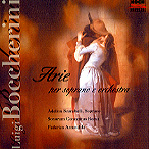In reading the brief notes included with this CD, the part that got to me was how Boccherini, the great cellist and composer revered all over Europe and even mentioned by some observers as equal to Haydn, died in “abject poverty”, no longer even owning a cello, but rather a viola–with broken strings, no less. (If this weren’t so sad, there certainly would be a joke in there somewhere.) His fame of course rested on his huge body of practical, popular, playable chamber works for strings–quintets, quartets, trios, duos, sonatas–and for his cello concertos and symphonies. It’s unlikely that he could have commanded similar esteem, or even be remembered today, on the strength of vocal works such as these concert arias–not because they’re not any good, but because of the limited scope and historical reach of the genre, and because, unlike Mozart, Boccherini had no opera-composer coattails to draw attention to and otherwise keep alive these respectable and occasionally outstanding works. Here is a composer at home with melody and in possession of a certain dramatic flair that would have stood very well in an operatic setting, and it’s unfortunate that these pieces have been virtually neglected for so long.
These arias were intended for performance in “subscription concert societies” and each is set to a text by the great Italian poet Pietro Metastasio, whose librettos were popular with composers such as Mozart, Handel, and Gluck. Indeed, the aria Care luci, che regnate, from Act 3 Scene 4 of Metastasio’s Issippile, is so Mozartian in style and in the beauty of its melody that it wouldn’t be hard to imagine it as a long-lost stray from Wolfgang Amadeus’ catalog. And the hands of both Mozart and Haydn seem to have moved across the pages of the score to the program’s final work, Infelice invan mi lagno, from Metastasio’s Adriano in Siria, a piece full of melodic grace and rhythmic vigor, and enough vocal pyrotechnics to challenge the finest singer.
Which brings us to the marvelous soprano Adelina Scarabelli–an opera singer’s name if ever there was one!–who is totally in command of every line, every phrase, every nuance of light and shade. In short, she’s wonderful, and her bright, colorful, agile voice and impeccable technique are perfect for this music. Scarabelli is the ideal advocate for these very difficult pieces, many of which run 10 minutes or longer and require not only stamina, but a solid mastery of the music’s many-faceted dramatic demands. The main problems with the disc are its sound, which strangely varies from cavernous to close-up; the opening aria, which begins with an extended recitative that nearly stops the performance before it really has a chance to get our full attention; and the fact that there’s absolutely no information about Scarabelli–a singer who certainly deserves better recognition, and who, I hope, will favor us with many more recordings.
































